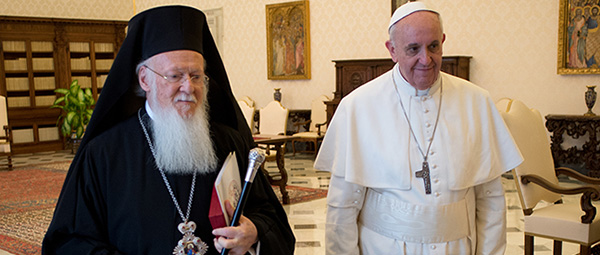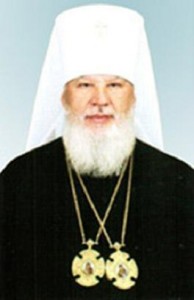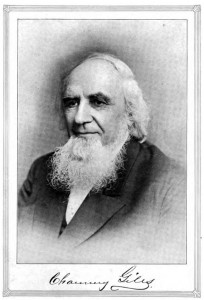Joint Statement Celebrating the Meeting of Ecumenical Patriarch Bartholomew and Pope Francis
Fifty years ago, in January 1964, two great Christian leaders met in Jerusalem. Pope Paul VI of Rome and Ecumenical Patriarch Athenagoras of Constantinople swept aside centuries of hostility and embraced one another in the city where Christ was crucified and rose from the dead. The Pope’s gift of a chalice to the Patriarch and the Patriarch’s gift of an encolpion (an episcopal pectoral medallion with an icon of Christ) to the Pope showed that they were determined to work for the victory of love over enmity, of communion over division. Reflecting on that encounter immediately after returning to Rome, Pope Paul said, “I had this morning the great happiness of embracing – after a gap of many centuries – the Ecumenical Patriarch of Constantinople. We hope that these beginnings will bear good fruit, that the seed will spring up and become fully ripe.”
Fifty years later, we rejoice that those beginnings in Jerusalem have indeed born good fruit. In December 1965 both Churches consigned the 1054 excommunications between Rome and Constantinople to oblivion, erasing them from the memory of the Church. Meetings between Popes and Ecumenical Patriarchs and other contacts became more common, and led to the establishment of an international theological dialogue between the two churches that met for the first time in 1980 and continues to the present day.
Here in the United States, the leaders of our churches followed the example set by the Pope and the Ecumenical Patriarch and – at the initiative of Archbishop Iakovos of the Greek Orthodox Archdiocese – set up a national theological dialogue in 1965, which has functioned uninterruptedly since its establishment. Joined on the Catholic side by the Canadian Conference of Catholic Bishops in 1997, this theological consultation has issued thirty agreed statements over the years, carefully examining the issues that still divide us and proposing ways to resolve them.
We wish to take the opportunity presented by the meeting between Pope Francis and Ecumenical Patriarch Bartholomew in Jerusalem in May 2014 to reaffirm the dialogue of love initiated by Pope Paul VI and Patriarch Athenagoras and to continue to strive to remove that which separates us. We not only express our appreciation of the work of our North American dialogue, but also our joy that our Churches have increasingly been able to speak with one voice on the pressing issues that our society faces today. We commit ourselves to increased cooperation in these areas, including social, economic, and ethical dilemmas, and we call our people to pray for the success of the upcoming meeting between Pope Francis and Ecumenical Patriarch Bartholomew in Jerusalem for the glory of God and the promotion of Christianity in our wounded world.
| Archbishop Joseph E. Kurtz of Louisville, KY President of the U.S. Conference of Catholic Bishops |
Archbishop Demetrios Chairman, Assembly of Canonical Orthodox Bishops of the United States of America |






